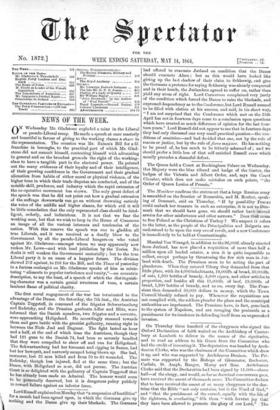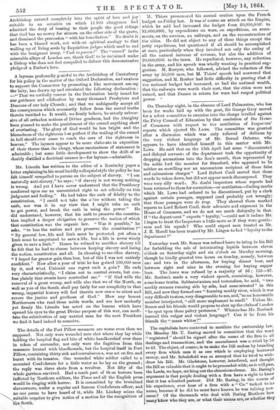On Thursday three hundred of the clergymen who signed the
Oxford Declaration of faith waited on the Archbishop of Canter- bury at Lambeth to deliver in the names of the signitaries, and to read an address to his Grace from the Committee who had the credit of inventing it. The deputation was headed by Arch- deacon Clerke, who was the chairman of the Committee which drew it up, and who was supported by Archdeacon Denison. The Pri- mate was supported by the Bishops of Gloucester, Rochester, Carlisle, St. Asaph, Bangor, Moray and Ross. Archdeacon Clerke said that the Declaratidn had been signed by 11,000—above half—of the clergy, and would, so far as doctrinal concurrence goes, have received the assent of thousands more. The Committee declare that to have received the assent of so many clergymen to the doc- trine that the Bible "not only contains, but is the Word of God," and "that the pnniArnent of the cursed, equally with the life of the righteous, is everlasting," fills them "with fervent joy that they have been allowed to promote the glory of our Lord." ,he
.Archbishop entered completely into the spirit of love and joy suitable to an occasion on which 11.000 clergymen had admitted the duty of bearing to their people the good tidings that God has no mercy for sinners on the other side of the grave, and dismissed the procession "with his benediction." No doubt it has been a blessed work, not without spiritual analogy to that walling up of living souls by Inquisition judges which used to end with the benignant irony, "Vade in pacem 1" The "cursed" in the miserable alleys of London are, thank God! to be reclaimed under a Bishop who does not feel compelled to deliver this demonstrative pledge of a Father's love.































